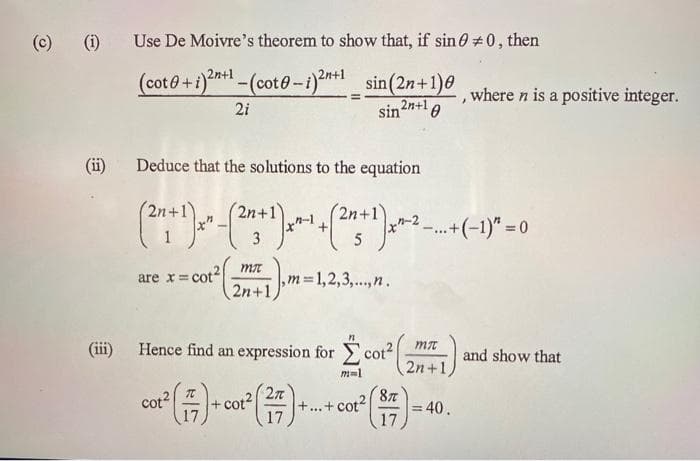(c) (i) Use De Moivre's theorem to show that, if sin 0+0, then (coto+i)2n+¹-(coto-i)²+1_sin (2n+1), where n is a positive integer. 21 sin 2n+10 (ii) Deduce that the solutions to the equation (2¹+¹)x² - (²x + ¹) x^-¹ + (²x + ¹) x^² + (-1)" = 0 3 5 are x=cot2 mi 2n+1, m = 1,2,3,..., n. (iii) Hence find an expression for cot² ma 2n+1, m=1 cot² (7) + cot² (27)++ ct² (7) 40. 2π 87 +...+cot² = 17 17 and show that
(c) (i) Use De Moivre's theorem to show that, if sin 0+0, then (coto+i)2n+¹-(coto-i)²+1_sin (2n+1), where n is a positive integer. 21 sin 2n+10 (ii) Deduce that the solutions to the equation (2¹+¹)x² - (²x + ¹) x^-¹ + (²x + ¹) x^² + (-1)" = 0 3 5 are x=cot2 mi 2n+1, m = 1,2,3,..., n. (iii) Hence find an expression for cot² ma 2n+1, m=1 cot² (7) + cot² (27)++ ct² (7) 40. 2π 87 +...+cot² = 17 17 and show that
Algebra & Trigonometry with Analytic Geometry
13th Edition
ISBN:9781133382119
Author:Swokowski
Publisher:Swokowski
Chapter7: Analytic Trigonometry
Section7.4: Multiple-angle Formulas
Problem 41E
Related questions
Question
Answer all the parts otherwise don't solve it

Transcribed Image Text:(c) (i)
Use De Moivre's theorem to show that, if sin 0+0, then
(coto+i)2n+¹-(coto-i)²+1_sin (2n+1), where n is a positive integer.
21
sin 2n+10
(ii) Deduce that the solutions to the equation
(2¹+¹)x" - (2+¹) x^-¹ +(2+¹)x^-+-+1)* = 0
3
5
are x=cot2
mi
2n+1,
,m=1,2,3,..., n.
(iii) Hence find an expression for cot²
mi
2n+1,
87
cot² (7) - co² (27)++ ct²() - 40.
+cot2 +...+ cot2 =
17
17
m=1
and show that
Expert Solution
Step by step
Solved in 10 steps with 10 images

Recommended textbooks for you

Algebra & Trigonometry with Analytic Geometry
Algebra
ISBN:
9781133382119
Author:
Swokowski
Publisher:
Cengage

Algebra & Trigonometry with Analytic Geometry
Algebra
ISBN:
9781133382119
Author:
Swokowski
Publisher:
Cengage